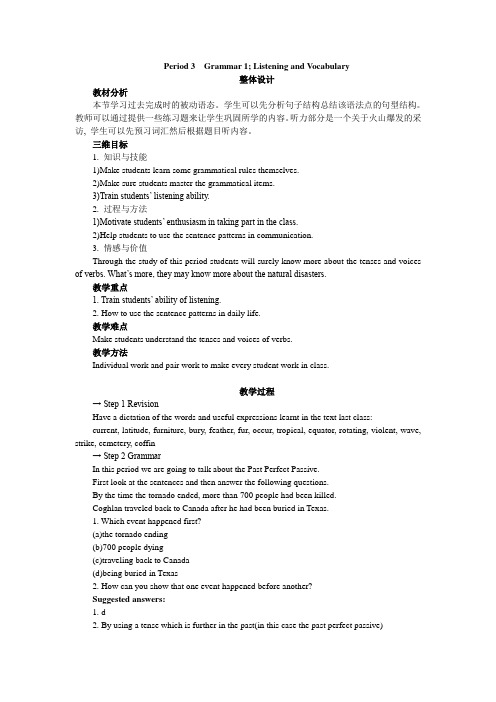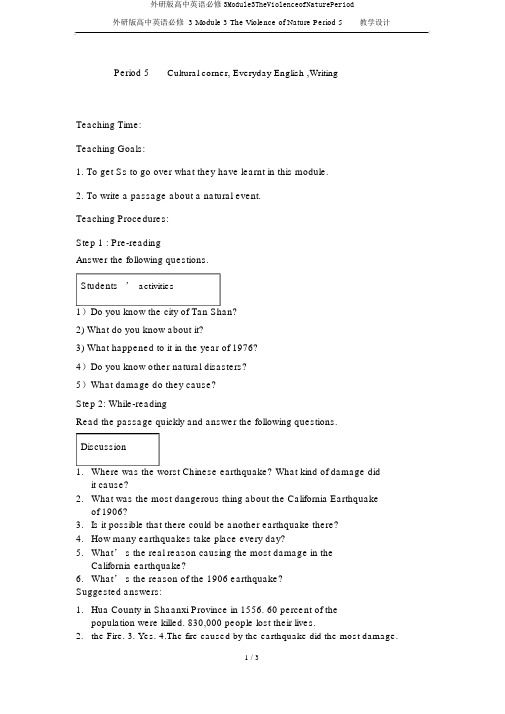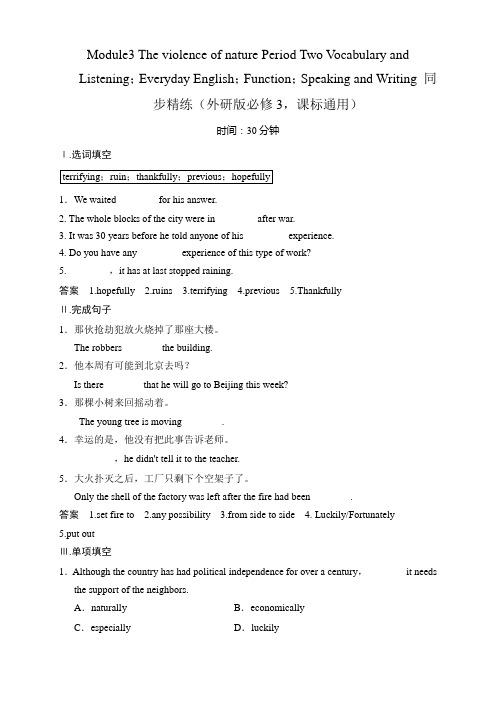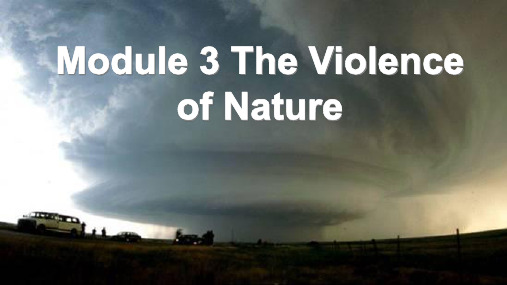外研版高一英语必修三Module 3The Violence of Nature非谓语动词课件(共2
- 格式:ppt
- 大小:131.50 KB
- 文档页数:24

Period 3Grammar 1; Listening and Vocabulary整体设计教材分析本节学习过去完成时的被动语态。
学生可以先分析句子结构总结该语法点的句型结构。
教师可以通过提供一些练习题来让学生巩固所学的内容。
听力部分是一个关于火山爆发的采访, 学生可以先预习词汇然后根据题目听内容。
三维目标1. 知识与技能1)Make students learn some grammatical rules themselves.2)Make sure students master the grammatical items.3)Train students’ listening ability.2. 过程与方法1)Motivate students’ enthusiasm in taking part in the class.2)Help students to use the sentence patterns in communication.3. 情感与价值Through the study of this period students will surely know more about the tenses and voices of verbs. What’s more, they may know more about the natural disasters.教学重点1. Train students’ ability of listening.2. How to use the sentence patterns in daily life.教学难点Make students understand the tenses and voices of verbs.教学方法Individual work and pair work to make every student work in class.教学过程→ Step 1 RevisionHave a dictation of the words and useful expressions learnt in the text last class:current, latitude, furniture, bury, feather, fur, occur, tropical, equator, rotating, violent, wave, strike, cemetery, coffin→ Step 2 GrammarIn this period we are going to talk about the Past Perfect Passive.First look at the sentences and then answer the following questions.By the time the tornado ended, more than 700 people had been killed.Coghlan traveled back to Canada after he had been buried in Texas.1. Which event happened first?(a)the tornado ending(b)700 people dying(c)traveling back to Canada(d)being buried in Texas2. How can you show that one event happened before another?Suggested answers:1. d2. By using a tense which is further in the past(in this case the past perfect passive)Now students have known more about the past perfect passive.Do some exercises to consolidate it.(Show the following sentences on the screen. )Choose the correct tense and voice to complete each sentence.Example: The survivors of the earthquake were the ones who stayed(stay)in the village1. After the hurricane, Mary_____________ (see)that the roof of her house _____________ (disappear).2. She_____________ (return)home and_____________ (find) all her furniture _____________ (ruin)by the flood.3. Arthur was surprised when he_____________ (arrive)home because the tornado _____________ (take)the feathers off his chickens.4. We_____________ (leave)the house when the thunderstorm_____________ (finish).5. He_____________ (try)to drive back to his home before the flood _____________ (pass)through the village.Suggested answers:1. saw; had disappeared2. returned; found; had been ruined3. arrived; had taken4. left; had finished5. tried; passedPlease complete these sentences with the verbs form the box. Use the past perfect(Show the following on the screen. )destroy die fall flood kill1. After the earthquake, they discovered that several people_____________ .2. When the hurricane ended, several buildings in the town_____________ .3. His village_____________ in the heavy rain, so he moved to his par ents’ house.4. When she woke up, she found that her house_____________ by the thunderstorm.5. Arthur was unhappy because some of his animals_____________ .(Ask students to answer the questions. )Suggested answers:1. had been killed/had died2. had been destroyed/had fallen down3. had been flooded/had been destroyed4. had been destroyed5. had died/had been killed→ Step 3 Listening and V ocabularyFirst let students read the words in the table after the teacher.ash erupt lava tidal wave volcanoThen locate the above words in the short passage and try to make sense of them.Suggested answers:ash: paragraph 3 line 1.erupt: erupted: paragraph 2 line 1; eruption: paragraph 2 line 3lava: paragraph 3 lines 2 and 3tidal wave: paragraph 3 lines 4-5volcano: volcanoes: paragraph 1 line 3, paragraph 2 line 1, volcano: paragraph 2 line 2, paragraph 3 lines 2 and 3Now that students have a better understanding of the passage, ask them to work out the connections between the words in Activity 1.Sample sentence:I guess when a volcano erupts, three of the outcomes are ash, lava and tidal waves.The topic in this module is natural disasters. The listening material is also about ae mayor of the city Plymouth.Before the listening answer these questions:1. Ash and lava poured down the mountain, setting fire to hundreds of houses.Does this mean that(a)a fire started or(b)a fire ended?2. Hundreds of houses caught fire when the lava reached them.Does this mean that the fire started because of(a)a person or(b)a natural event?3. We managed to get half the population to another island.Does this mean it was(a)an easy thing to do or(b)a difficult thing to do?4. We put all the fires out.Does it mean the fires(a)are still burning or(b)have finished?Suggested answers:1. a2. b3. bActivity 4(Play the tape for students to finish Activity 4. )Listen to the tape and then answer the following questions:1. Where are they?2. Who are the two people in the conversation?3. Is a volcanic eruption taking place now?4. How many people have already left the island?5. How many people were killed by the eruption?6. When will people be able to return to their homes?Suggested answers:1. In the centre of Plymouth, capital of Montserrat.2. A reporter and Frank Savage, Governor of the island.3. No, it isn’t.4. About 6000.5. None.6. They don’t know.→ Step 5 Summary and HomeworkIn this period students have learned one of the verPassive. What’s more, they have practiced their listening skills.Homework:用动词适当的形式填空1. By the time the tornado ended, more than 700 people_____________ (kill).2. Coghlan travelled back to Canada after he_____________ (bury)in Texas. 答案: 1. had been killed 2. had been buried板书设计Module 3The Violence of NaturePeriod 3 Grammar 1; Listening and V ocabularyBy the time the tornado ended, more than 700 people had been killed. Coghlan travelled back to Canada after he had been buried in Texas.1. Which event happened first?2. How can you show that one event happened before another?活动与探究1. Learn how to use the Past Perfect Passive correctly.2. Practice listening skills.。

外研版高中英语必修 3 Module 3 The Violence of Nature Period 5教学设计Period 5Cultural corner, Everyday English ,WritingTeaching Time:Teaching Goals:1.To get Ss to go over what they have learnt in this module.2.To write a passage about a natural event.Teaching Procedures:Step 1 : Pre-readingAnswer the following questions.Students’ activities1)Do you know the city of Tan Shan?2)What do you know about it?3)What happened to it in the year of 1976?4)Do you know other natural disasters?5)What damage do they cause?Step 2: While-readingRead the passage quickly and answer the following questions.Discussion1.Where was the worst Chinese earthquake? What kind of damage didit cause?2.What was the most dangerous thing about the California Earthquakeof 1906?3.Is it possible that there could be another earthquake there?4.How many earthquakes take place every day?5.What’ s the real reason causing the most damage in theCalifornia earthquake?6.What’ s the reason of the 1906 earthquake?Suggested answers:1.Hua County in Shaanxi Province in 1556. 60 percent of thepopulation were killed. 830,000 people lost their lives.2.the Fire.3. Yes.4.The fire caused by the earthquake did the most damage.1 / 35.the movement on the San Andreas Fault.Step 3:Post-readingDiscuss the following questions.1.Have you been told what to do if there was an earthquake?2.What would you do if there was an earthquake in your town?Step 4. Everyday English.a.answer the questions about these words.Luckily unfortunately thankfully Hopefully sadly fortunately1.Which of the words indicates that the following sentence containsgood news?2.Which indicates that the sentence contains bad news?Suggested answers:1. luckily; thankfully; hopefully, fortunately2. sadly unfortunatelyb. choose one of the words to complete these sentences.1._________, we had plenty of warning.2._________, there were several villages in its path.3._________, no one was killed.4. _________, it won’ t be too long.5._________, hundreds of houses caught fire when the lava reached them.6._________, we put all the fire out quite quickly.Suggested answers:1.Luckily; Thankfully; Fortunately2.Sadly Unfortunately3.Luckily; Thankfully; Fortunately4.Luckily; Thankfully; Hopefully, Fortunately5.Sadly Unfortunately6.Luckily; Thankfully; FortunatelyStep 5: Guided Writing1.Make a list of natural disasters that you can remember.2.Find more information on the Internet or other resources.3.Write about a violent natural event, using the phrases we have learnedin this module.Homework:1.Write a summary of the whole passage.2.Finish the other exercises of this module.2 / 3Teaching thought:3 / 3。

Module3 The violence of nature Period Two V ocabulary andListening;Everyday English;Function;Speaking and Writing 同步精练(外研版必修3,课标通用)时间:30分钟Ⅰ.选词填空terrifying;ruin;thankfully;previous;hopefully1.We waited ________for his answer.2. The whole blocks of the city were in________ after war.3. It was 30 years before he told anyone of his ________ experience.4. Do you have any ________ experience of this type of work?5. ________,it has at last stopped raining.答案 1.hopefully 2.ruins 3.terrifying 4.previous 5.ThankfullyⅡ.完成句子1.那伙抢劫犯放火烧掉了那座大楼。
The robbers________the building.2.他本周有可能到北京去吗?Is there________that he will go to Beijing this week?3.那棵小树来回摇动着。
The young tree is moving________.4.幸运的是,他没有把此事告诉老师。
________,he didn't tell it to the teacher.5.大火扑灭之后,工厂只剩下个空架子了。
Only the shell of the factory was left after the fire had been________.答案 1.set fire to 2.any possibility 3.from side to side 4. Luckily/Fortunately5.put outⅢ.单项填空1.Although the country has had political independence for over a century,________it needs the support of the neighbors.A.naturally B.economicallyC.especially D.luckily答案B[句意:虽然这个国家在政治上已经独立了一个多世纪,但是在经济上还需要邻国的帮助。

Book 3 Module 3 The Violence of NaturePeriod 1 Key words【课前预习】1.主题语境:本模块为“人与自然”主题下对“自然灾害与防范的探讨”。
文章介绍了龙卷风、飓风、地震等几种自然灾害,并描绘了人们在自然灾害中的经历和感受。
2.表达性技能:学会写一篇关于自然灾害的报道。
3.课时任务:通过阅读课文,了解龙卷风、飓风等自然灾害以及与飓风有关的奇怪事件,体会人们在经历自然灾害之后的感受,了解自然灾害的危害,提高自我保护和珍爱生命的意识。
【知识清单】一、[原文再现] Do you know anyone who has experienced one of the events? 你知道有谁经历过这些事件中的一件吗?experience vt. 经历;体验n. [C]经历;体验[U]经验常用搭配:experienced adj.有经验的;经验丰富的be experienced in在……方面有经验from / by experience 凭经验;从经验中full of experience 经验丰富have experience in在……方面有经验get / gain experience 获得经验1.What I saw was completely unlike anything I had experienced in the past.我所看到的完全不同于我过去所经历的。
2.She wants to know why her grandfather never spoke about his experiences in World War II.她想知道为什么祖父从不谈起他自己在第二次世界大战时的经历。
3.In the early days, she moved jobs to get experiences. 起初她通过换工作来获得经验。
4.I have experience in checking information from printed sources and from interview.我有从印刷资料及采访中校验信息的经验。


Module 3 The Violence of NaturePeriod 1 Vocabulary and Speaking , Function Giving a definitionTeaching Time:Teaching Aims:Knowledge and Skill:a.Get the general information about the violence of nature.ing the Attributive Clause to explain words..c.Improve the students’ ability to give definitions of words.d.Know the common enemies of our human being – natural disasters andthe ways of surviving when one occurs.e.To grasp the usage of the past perfect passive and indirect speech.Emotion and Values:a.Fully realize the characteristics of different natural disasters and thedanger they caused, improve the confidence of overcoming them, and try to make contributions to the development of the whole society.b.To encourage the Ss to be active and cooperative in the classCross-cultural awareness:Understand the natural disasters of different area and multi-form intensity of all parts of the worldCharacter-building:a.To strengthen their confidence of learning well in order to make a betterworld for our next generation.b.To let them know the ways of keeping them safe when some naturaldisasters occur.Difficulties and Importance:a. Learn how to definite words, using the Attributive Clauseb. How to change the direct speech into the indirect ones.c.Improve the student’s ability of grasping the general idea of the passage.Teaching Method:a.Task-based methodologymunicative ApproachTeaching Procedures:Step 1:Warming upLook at the picture and answer the following questions.Q1. Have you ever heard of the tsunami in 2021?Q2. When and where did it happen?Q3. What kind of damage did it cause?Q4. Can you list some of other natural disasters?Q5. Tsunamis are natural occurrences. Can humanbeings stop them?Suggested answers:Q1. Yes.Q2. At the end of 2021, a massive earthquake sent tsunami smashing into Indian Ocean coastline. Many heavily populated areas disasters from it.Q3. Sri Lanka , Indonesia , Thailand , India, Malaysia and East Africa destroyed by the monster waves, causing millions of deaths.Q4. Flood, Fire, drought, landslide, earthquake, tornado, hurricane and so on.Q5. No. Tsunamis are a natural occurrence rela ted to the processes that shape the Earth's surface—earthquakes, volcanoes, and landslides. These processes are driven by the heat escaping from the Earth and gravity, and people cannot control these underlying forces.Step 2:Vocabulary LearningMatch the words in the box with their definitions.Flood hurricane lightning thunderstorm tornado1. a lot of water in an area which is usually dry2. a very strong wind or storm3. a lot of rain falling quickly, with loud noises and flashes of light4.the flash of light which happens during a thunderstorm5. a column of air that turns very quickly.Suggested answers:A flood is a lot of water in an area which is usually dry.A hurricane is a very strong wind and storm.Lightning is the flash of light which occurs during a thunderstorm.A thunderstorm is a lot of rain falling quickly, with loud noises and flashes of light.A tornado is a column of air that turns very quickly.Step 3 :FunctionTry to find the common characteristic of the sentences above.Suggested answers:Each sentences gives a definition of a word.The Attributive Clause appears in each sentence.When we give a definition of a word, the Attributive Clause is usually necessary and hopeful. We’d better learn to use the structure “A is B that/which〞Step 4 :PracticeGive definitions of the words following the pattern “A is B that/which〞.An earthquake a volcanic eruption a plane crashSuggested answers:1.An earthquake happens when the earth shakes because of movementunderground.2. A volcanic eruption is that lava and ash coming out of a volcano.3. A plane crash is that a plane stopping flying and crashing into the earth.1. Which kind of these natural disasters have ever experienced? Can youdescribe it?2.Have you ever read a news story about one of the events? Can you describeit?3.Do you know anything about the events? For example, what causes them? Homework:1.Surf the Internet in order to have a better understanding of naturaldisasters.2.Preview the passage in Reading and Vocabulary.Teaching thought:。
[教材优化全析]Introduction1.a column of air that turns very quickly迅速旋转的空气柱column(1)[C]圆柱,柱状物。
例如:the carved columns in the temple寺庙中的雕刻圆柱a column of smoke 一缕烟(2)[C](报纸等的)栏;段。
例如:The article runs across four columns.那篇文章占了4栏的篇幅。
2.Connect all the words you find out that refer to the same thing.连接指示相同事物的单词。
refer to提到,谈到,涉及;参考,查阅。
例如:Are you referring to me?你是说我吗?In his speech,he didn’t refer to the problem at all.在他的演讲中,他丝毫没有触及那个问题。
His name was referred to in the meeting.他的名字在会议中被提及。
Reading and vocabulary1.The Gulf Stream is a warm ocean current which starts in the Gulf of Mexico and flows northeast across the Atlantic.海湾洋流是暖洋流,起源于墨西哥湾,向东北方向流过大西洋。
current [C] 水流,气流,电流。
例如:the current of a river河水的水流The current of cool air is coming from the air conditioner.那股冷风是从空调机里吹出来的。
current [C](事情、舆论等的)动向,趋势;潮流。
例如:the current of public opinion舆论的动向Her son’s death broke the peaceful current of her life.儿子的死亡扰乱了她平静的生活步调。
Module 3The Violence of NaturePeriod 2Reading and vocabulary整体设计教学内容分析作为本模块的主课文,这三篇文章应该作为精读课来处理。
这节课应该以训练学生的阅读理解能力为主。
教师应该给学生提供一些阅读方法的指导来帮助学生提高略读(skimming)和查读(scanning)的能力。
学生应该在快速略读(skimming)后把握每篇课文的主旨大意,在查读(scanning)后获取关于每篇课文的一些具体信息。
读后活动的设计应该集中在考查学生对每个自然灾害及其带来的危害与损失的理解和表述上。
在这节课,学完课文之后,学生应该能够学会给某一自然灾害下定义,并学会用自己的话描述每个自然灾害。
此外,学生应该熟练掌握与运用本课课文中出现的描述自然灾害的动词和动词短语。
三维目标设计Knowledge and skills1.To help the students learn the following words and expressions.(The context should be emphasised.)Words:current,latitude,furniture,bury,feather,fur,occur,tropical,equator,rotating,violent,wave,strike,cemetery,coffinExpressions:pick up,take off,on average,end up2.To help the students revise the following words and expressions in this period:Words:flow,death,injury,affectExpressions:more than,put down3.To help the students master ways of describing disasters using words and expressions they've learnt.Process and methods1.To encourage the students to take an active part in the learning activities by giving them clear instructions on what to do while reading a new passage.In addition,correct possible mistakes they might make in a proper way by making necessary changes while repeating their sentences.2.To encourage the students to cooperate with the others by working in pairs and in groups of four.3.To make sure that the students pay attention to important points by asking them to repeat some of the statements made by both the teachers and other students.Emotional,attitude and value1.To let the students have confidence in learning English and express themselves freely.2.To help the students to appreciate the advantage of cooperative learning.教学重点1.To help the students to learn how to read a passage in a proper way and improve their ability of skimming and scanning.2.To help the students to master the verbs and verb phrases to describe a disaster.3.To help the students learn to organize their own sentences to describe disasters.教学难点1.To help the students to learn to organize their own sentences to describe disasters.2.To carry out accurate evaluation while dealing with the students' sentences they make to express their ideas in class.教学过程Pre-reading 【5 min.】1.Ask the students to read about the Gulf Stream and learn about the meaning of it.2.Warm up:Ask the students to take a look at the two photos on page 23 and try to describe the first impression of each disaster.Call back some answers from the class.While-reading 【20 min.】1.SkimmingAsk the students to read through the three passages fast and silently,and pay attention to thefirst sentence of each passage.Give them suggestions that they should focus on the general idea and not on the detailed meaning.Check the main idea of each passage with the whole class.2.Scanning1.Get the students to read the third passage again and retell the story according to the following key words and time clue.born→lived→moved→By the late 1890s→In 1899→In 1900→destroyed→ended up in→wa s found2.DiscussionGet the students to work in groups of four and discuss the following two questions according to the instructions.Instructions :From this class ,we have learnt the bad results of the natural disasters ,including the tornado and the hurricane.We have felt the violence of nature.Everybody wants a better place to live.But we can't tell nature to do what we want it to.In fact ,one of the causes of the natural disasters is the problem of global warming.Please have a group discussion and try to discuss the following questions.1)What's your idea about the problems that nature brings to us.________________________________________________________________________2)Faced with so many problems ,what can we do?________________________________________________________________________Language study 【8 min.】1.Punctuate the following paragraph and translate it ,paying attention to the underlined words or phrases.tornadoes can pick_up cars trains and even houses and put them down in the next street or even in the next town they can_take the fur off the back of a cat and the feathers off_a chicken they can destroy houses but leave the furniture inside exactly where it was2.Read the following sentences and write down the meaning of pick up in each sentence.1)Tornados can pick up cars ,trains and even houses.______2)The boy picked up the hat for the old man.______3)He picked up French while he stayed in Paris.______4)Can you do me a favor to pick up my daughter from school ?______5)He picked up some used stamps.______3.Read the following sentences and tell the common use of the underlined words.1)The worst hurricane disaster of all time occurred_on the 8th September 1900 in Galveston ,Texas.2)Winds of 200 kilometres per hour and five-metre high waves hit the city.3)By the late 1890s,he had moved to Galveston,where he died in 1899,a year before the hurricane struck.4.Translate the sentence using the three words occur,hit and strike.2008年5月12日,汶川发生了可怕的大地震。
Module 3 The Violence of Nature自然暴力中心词汇1 .Thesechemicals have been found to cause serious environmental____________( 损害 >.b5E2RGbCAP2 .The government has issued a____________( 警告 >that the fish may not be fit to eat. p1EanqFDPw3 .The earthquake was one of the worst natural____________( 灾祸 >the country has ever suffered. DXDiTa9E3d4 . ____________( 满怀希望地 >, I managed to pay off all my debts before we got married. RTCrpUDGiT5 . Do you have any____________( 以前的 >experience of this type of work? 5PCzVD7HxA6 . I helped him choose the____________(家具>for his new house. jLBHrnAILg7 . It was so hot that sweat____________(流淌>down from his face. xHAQX74J0X8.Strong____________(水流>can be very dangerous for swimmers. LDAYtRyKfE9 .He is ____________the most famous writer of the generation,so it is____________that he can win a prize.There’ s ____________thathe will win the first prize.(possible>Zzz6ZB2Ltk10.He was ____________to think of the____________experience,which ____________him.(terrify>dvzfvkwMI11.damage2.warning3.disasters4.Hopefully5.previous6.furniture7.poured8.cur rents9.possibly;possible;possibility10.terrified;terrifying;terrified rqyn14ZNXI高频短语1.________________ 卷起;掀起;拿起,捡起,拾起2 .________________ 记下;放下3.________________ 脱下,去 ( 拿>掉4 .________________ 平均起来,一般说来5 .________________ 到时为止6 .________________ 以结束 / 结果为7 .________________ 使着火;放火烧8 .________________ 着火9 .________________ 扑灭;熄灭;伸出10.________________ 发生11. ________________ 总计,合计12.________________ 失去生命1.pick up2.put down3.take off4.on(the>average5.by the time6.end up7.set fire to sth.8.catch fire9.put out 10.take place 11.in all 12.lose one ’s life EmxvxOtOco重点句式1.They can destroy houses ,but________the furniture inside exactly________________.SixE2yXPq5它们能毁掉房屋,却把房内的家具留在原处。